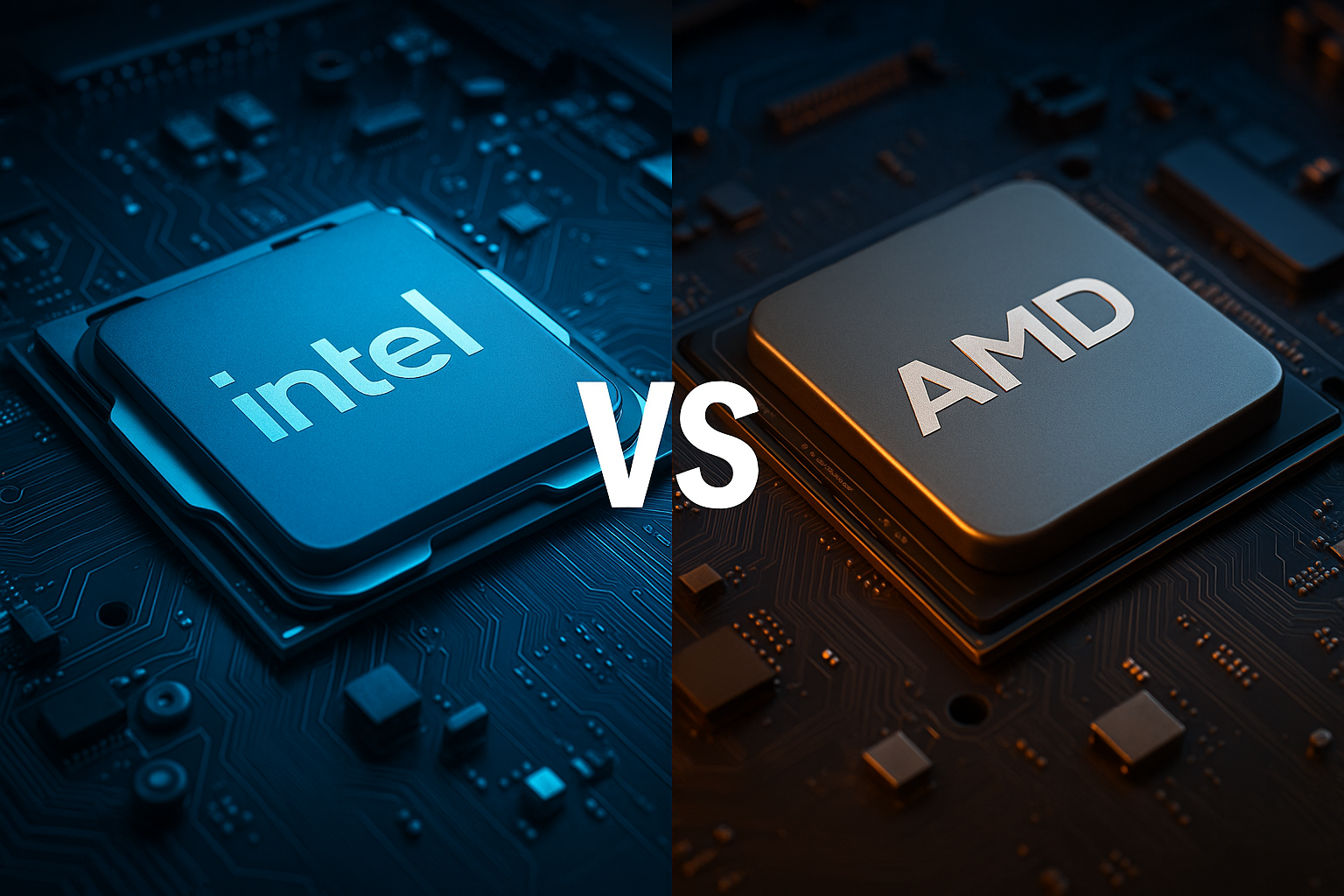Choosing the right processor is one of the most important decisions when building or upgrading a PC. In 2025, the competition between Intel and AMD continues to push the limits of performance, efficiency, and innovation.
But which brand is better for your needs? In this guide, we’ll compare Intel and AMD CPUs across several categories to help you decide.
Why the CPU Choice Matters
Your processor determines how fast your computer runs, how many tasks it can handle simultaneously, and how well it performs under demanding workloads like gaming, video editing, programming, or multitasking.
While both Intel and AMD offer excellent CPUs, each has its own strengths — and your ideal choice depends on what you plan to do with your PC.
Performance: Head-to-Head Comparison
Intel
Intel’s 14th-gen (Raptor Lake Refresh) and upcoming 15th-gen (Arrow Lake) CPUs are known for their strong single-core performance, which is especially beneficial for:
- High-frame-rate gaming
- Programs that rely on single-thread efficiency
- Low-latency tasks like music production
They also feature a hybrid architecture: combining performance cores (P-cores) and efficiency cores (E-cores), improving multitasking and background operations.
AMD
AMD’s Ryzen 7000 and 8000 series (Zen 4 and Zen 5) are extremely competitive. They offer:
- Excellent multi-core performance, great for rendering, streaming, and productivity
- Strong gaming performance that rivals Intel
- Efficient 5nm architecture (for lower power draw)
AMD’s CPUs are also known for having better integrated graphics in their “G” models — ideal for builds without a dedicated GPU.
Verdict:
- Gaming focus: Intel slightly leads in raw FPS
- Productivity and multi-threaded tasks: AMD often wins
- Balanced workloads: It’s nearly a tie
Price and Value
Intel
Intel CPUs tend to be more expensive at the top tier, especially when paired with newer motherboards and DDR5 RAM. However, older generations like 12th-gen are still solid and affordable.
AMD
AMD often offers better value, particularly in the mid-range (Ryzen 5 and Ryzen 7 series). Plus, their motherboards tend to be cheaper, and you can often reuse coolers across generations.
Verdict:
- Tighter budgets: AMD usually wins
- Top performance regardless of cost: Intel leads in high-end
Motherboard Compatibility
Intel
- New CPUs usually require new chipsets and sockets (e.g., LGA1700 → LGA1851 for Arrow Lake).
- Fewer upgrade paths for older boards.
AMD
- AMD uses the AM5 socket, introduced with Ryzen 7000, and plans to support it for several generations.
- This makes AMD more future-proof for upgraders.
Verdict:
- Long-term upgrade potential: AMD has a clear advantage
Power Consumption and Thermals
Intel
- Powerful, but more power-hungry, especially with overclocking.
- Can run hot under load, requiring better cooling.
AMD
- More efficient thanks to TSMC’s 5nm process.
- Cooler operation, lower power draw on average.
Verdict:
- Energy efficiency and quieter builds: AMD is better
Integrated Graphics
Intel
- Most Intel CPUs (non-“F” models) include Intel UHD Graphics.
- Suitable for basic use and light gaming, but not for demanding tasks.
AMD
- Ryzen models with “G” suffix (e.g., Ryzen 5 8600G) feature powerful Radeon integrated graphics.
- Great for budget builds with no GPU.
Verdict:
- No GPU build or casual gaming: AMD wins with stronger iGPUs
Overclocking
Intel
- Overclocking is allowed only on K-series CPUs (e.g., i5-13600K), and only on Z-series motherboards.
- Great performance gains, but expensive platform.
AMD
- Overclocking is enabled on most Ryzen CPUs and motherboards.
- Easier and more accessible for beginners.
Verdict:
- User-friendly and flexible overclocking: AMD is more approachable
Software and Driver Support
Both companies have mature software ecosystems, but Intel generally has broader support for certain legacy tools and professional applications.
AMD, on the other hand, is consistently improving its Adrenalin software suite and driver updates.
Verdict:
- Stability in older applications: Intel might be safer
- Gaming features and frequent updates: AMD leads
Best Use Cases: Intel vs AMD
| Use Case | Recommended Brand |
|---|---|
| High FPS Gaming | Intel |
| Streaming + Gaming | AMD |
| Video Editing and 3D Work | AMD |
| Light Office Work | Both |
| Budget Builds | AMD |
| Max Performance No Budget Cap | Intel |
| Future-Proof Upgrade Path | AMD |
Summary: Which CPU Should You Choose?
Both Intel and AMD offer excellent CPUs in 2025. Your choice should be guided by your budget, workload, and upgrade plans.
Choose Intel if you want:
- Highest gaming FPS
- Latest hybrid architecture performance
- You don’t mind paying for top-tier performance
Choose AMD if you want:
- Great performance per dollar
- Easier upgrade paths
- More efficient, cooler builds
- Better integrated graphics
